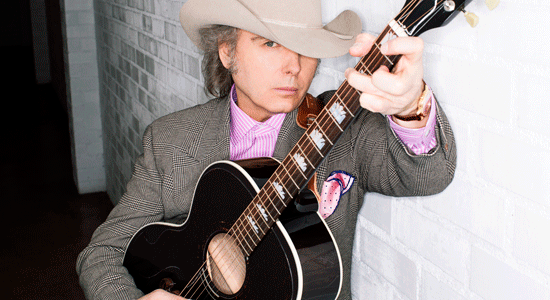
It’s been 30 years since the release of his twangy debut album, Guitars, Cadillacs, Etc., Etc., and 20 years since he first worked as a hard-assed thespian with actor/director Billy Bob Thornton (Sling Blade), and Dwight Yoakam is still doing very much the same thing—only twangier. Good. He’s currently finding his way through the deeply etched country sounds of rural America with his bold, bluegrass-laced new album, Swimmin’ Pools, Movie Stars, which harkens back to his roots in his Kentucky youth, as well as again working with Thornton on David E. Kelley’s Amazon drama Goliath. Whether it’s the tough-and-tender tang of his guitar, the quietly contentious snarl in his vocal drawl, whether he’s loving or fighting, or a face as recognizable as his sound, it seems as if time’s stayed still—in a great way—where Yoakam’s concerned. Plus, he’s good for a mean and flaky baked good—i.e., his Bakersfield Biscuits—so Yoakam is yummy, too.
Goliath has you and Billy Bob, and all I want to know is what kind of state law makes it that you two must work together as often as you do?
Are they putting the entire series up like they do on Netflix? Who knows? It was a cool thing to do, work with David E. Kelley and Billy Bob, whom I’ve worked with many times. This time we’re adversaries in a courtroom with most of my other scenes occurring with William Hurt.
Is there a bond between you two guys so that little is spoken within the context of a scene?
We’re mainly good friends, since making Sling Blade. We share age and cultural commonalities to say nothing of music. He’s directed me as an actor and observed me in special ways. We’re different in the literal ways in what we do and how we do it. He has unique reference points to me, and yes, I do think we have shorthand, probably because we trust one another. I hope he trusts me. I would like to see us do something big together—focused on just us—at some point. You know what about him: He’s a drummer to start. I think that informs what he does, not just as a musician, but in everything he does.
Thirty-years ago I spoke to you about Guitars, Cadillacs, Etc, Etc.
Did I have a plastic guitar prop as part of the promotion? Some molded, plastic, late-’50s looking thing?
Sure, it was the goofball ’80s.
I remember those first odd interviews with that plastic thing, which by the way, was not a toy.
The reason I bring this up is that during that chat, we talked about countrypolitan Bakersfield guitar session cats such as Don Rich and Buck Owens as part of the palette of inspirations for that first record. Were there bluegrass guys in the back of your mind who influenced this album in the same massive way that Buck and Don did Guitars, Cadillacs, Etc.?
Wow, that must have been before that first album even came out. Absolutely; Bill Monroe for one. We would open our shows back then with “Hear Me Calling.” We opened for Monroe, and he heard me, and I even asked him if it was OK to do some of his songs. That was fine by him. After one of the shows, he called me backstage, up to his makeshift office, and he pitched me more of his songs. I was flattered. He was the Elvis of bluegrass while Flatt & Scruggs were the Beatles. Nah, scratch that. Bill Monroe was Bill Monroe. A big part of my DNA, too, was the Stanley Brothers, which was cool because they were right across the state line from me. Years into my career, and it was more rockabilly than guitar-slinger rock ‘n’ roll. There was adolescent, mischievous abandon about it all, but the bluegrass thing stuck, even though I was covering stuff such as Monroe in that tougher way. When I realized that I enjoyed doing bluegrass straight, we did sets of bluegrass songs during our shows in ’05 and ’06.
That was really something. Can you pinpoint the first bluegrass album in the house back home?
There was an album at my granny and grandpa’s house in the holler in Kentucky. Brocade jacket, cowboy hat pulled down. It was a Jimmy Martin album. It was a hoot, which was strange because my grandpa was a very quiet man. He loved Flatt & Scruggs, too, though … hmm. That experience never left me: hearing those songs at my grandfather’s or even the radio in the holler. Oh, and Jimmy Martin is a great story, too—ostracized, in a way. Wasn’t allowed to be a member of the Opry. Played monster bluegrass. He became the first real rock ’n’ roll answer to straight bluegrass. “Sunny Side Of The Mountain.” A real outsider.
That could be you. Did Ralph Stanley reach out to you beyond guesting on his records? I’ve spoken with him and his grandson, such a gentleman.
A very quiet gentleman, thoughtful, quiet above all else. “Dwwiiiiiiiiiiiiiight,” he would say, “Where’d you get the bluegrass?”
I’m going to ask you the same question I asked Stanley: How is it, with all the traditions of bluegrass, that you can make or write or arrange bluegrass to be uniquely your own?
For lack of a more literate way of thinking of it, I did it by nature. I had him on my covers albums, and we did a Clash song, “Train In Vain.” Good English punk. “All right, Dwiiiiiiiiiiight, you wanna do it; we’ll do this.” I tried to make accommodations chord-wise for him and for the song, but he turned to me and he said, “It ain’t the mountain way.” You can’t do anything that isn’t the mountain way. That’s the key. It’s a cultural thing. Don’t be what you are not.
—A.D. Amorosi






